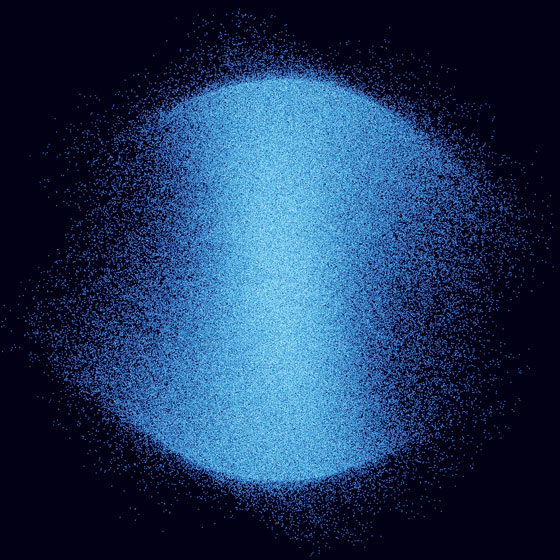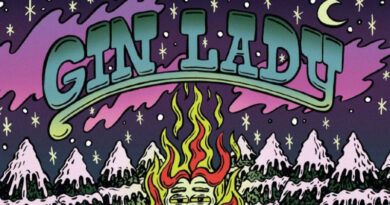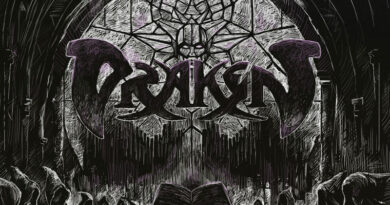Review: Deafheaven ‘Infinite Granite’
There’s almost a sliding doors moment between Deafheaven’s latest offering and their last studio outing, 2018s Ordinary Corrupt Human Love, an album that saw a huge leap forward in terms of enhancing their sonic palette with guest appearances from the likes of Chelsea Wolfe and wider instrumentalisation. The latter saw the band expand their sonic arsenal in pure Deafheaven style, incorporating clean singing and greater emphasis on the juxtaposition between the mesmerising melodies, light interludes, and the dark pummelling black metal they cut their teeth on.

On Infinite Granite a similarly ambitious epic, it’s the tender movements that are brought to the fore; the vocals are mostly clean sung and only fleeting moments see George Clark’s familiar raw throated scream start to dominate proceedings as the riffs swell and thrum around him. And with that, Deafheaven seemingly shake off the final vestiges of the millstone tag of being a black metal band.
Ten years into their career and Deafheaven still exist as a problematic band for some with their own take on ‘blackgaze’. It’s been a long hard road (to Judah) where as much as they’ve been embraced by the Pitchfork reading section of the musical community, they’ve been vilified by the internet white (black?) knights of black metal. On their latest album they seemingly take the final steps to commit to the sound that has caused such division.
Infinite Granite has been sold as a bold step forward, in fact there are only three moments on the whole nine track affair that even reference the harder edge and Clark’s tortured howl. Instead, they’ve created a largely ambient, bright and shining album of indie/shoegaze that revels in its melodic embrace.
Shellstar opens the album with lush, upbeat tempos, airy and light as a summer’s breeze that sees Deafheaven spread theirs wings and emerge from the darkness with hopeful and soulful intentions. Clark harmonises, employs breathy, whispered tones and rich, articulate singing to give voice to lyrics, abstract and full of cryptic mysticism, intelligible and intriguing as opposed to full of spite and the expression seems freer and less forced.
This shimmering brightness is not new to fans (or critics) of the band, as this orchestral synth and wistful musing has been a key feature of the music that even predates their Sunbather debut. Only on Infinite Granite these parts are no longer a segue between angst ridden moments; previously you would expect the mellow indie rhythms on In Blur to transition into the fast-paced death metal segments, but here they break out into effect laden choruses and huge 90s Brit pop era moments, like if the Stone Roses had laid off the smack and eaten a vegetable or two.
Rather than get drawn into that elitist crap, just listen to Infinite Granite with an open mind and appreciate its beauty…
It’s not until three songs in, lead track Great Mass, a moment with one of the biggest choruses on the album that Clark finally breaks into a muted scream towards the end. At this point it almost feels deliberate yet incidental, like a call back to something that once was, adding a layer and dimension to the song that in no way distracts or detracts from the elegance of what is happening. Elegance is an appropriate word though and this is, as well as the visionary scope of the song writing, the secret to Infinitive Granite’s success as it sounds absolutely fantastic in terms of sonic clarity.
Recruiting producer Justin Meldal-Johnsen (M83, Wolf Alice, Metric) to help bridge the gap from death metal to pop and retaining the ever present services of Jack Shirley to engineer and keep a degree of continuity, as well as nine-time Grammy Award winner Darrell Thorp (Foo Fighters, Radiohead, Beck) to handle mixing duties, the album shines and songs like Lament For Wasps ensure the psychedelic interplay between McCoy and Mehra is showcased as their most accomplished to date.
The skills of Daniel Tracy on drums and Christopher Johnson are not wasted either, they become central to providing a warmth, underpinning the tracks that adds dynamism as they get to express themselves more than just blast beats and open chord riff. When they’re called to move the music, they pop up a gear, like at the end of Villain or the harder edge The Gnashing, where they make the transition feel almost natural and as effortless, without jarring the dreamy atmosphere that permeates, as one moment slides gracefully into the next.
For all the criticism that has dogged Deafheaven in the past, you can’t help but listen to Infinite Granite and feel like this is the album they’ve been wanting to make for a long time. Whether it was passing the milestone of a decade (celebrated by the ‘live on a soundstage’ best of 10 Years Gone last year) or the final realisation that they’re really good at this and have taken the bold step to acknowledge it; they’ve made an album that should not be dismissed, or overlooked by genre purists, because it’s really, really good.
The irony of course by embracing this sound whole heartedly is that they will fuel the fire of the ‘not black metal brigade’ who never considered them black metal in the first place. Rather than get drawn into that elitist crap, just listen to Infinite Granite with an open mind and appreciate its beauty.
Label: Sargent House
Band Links: Official | Facebook | Bandcamp | Twitter | Instagram
Scribed by: Mark Hunt-Bryden



